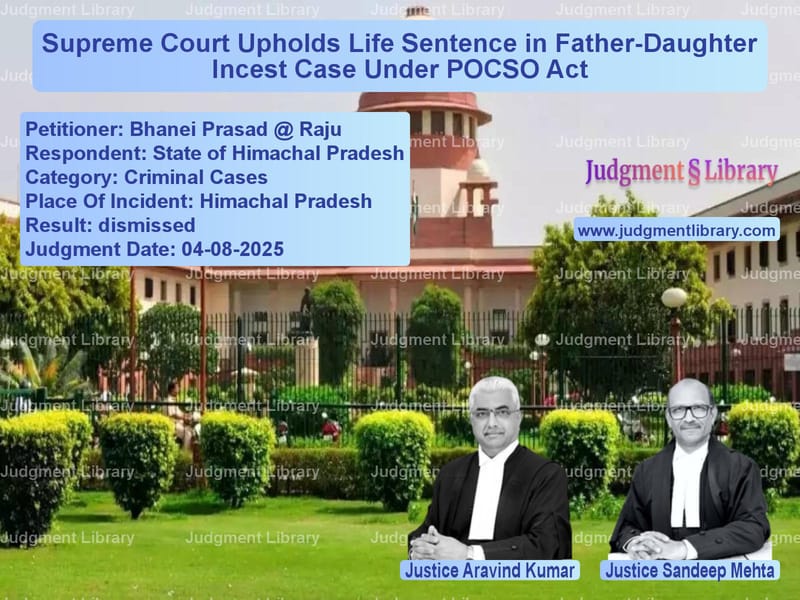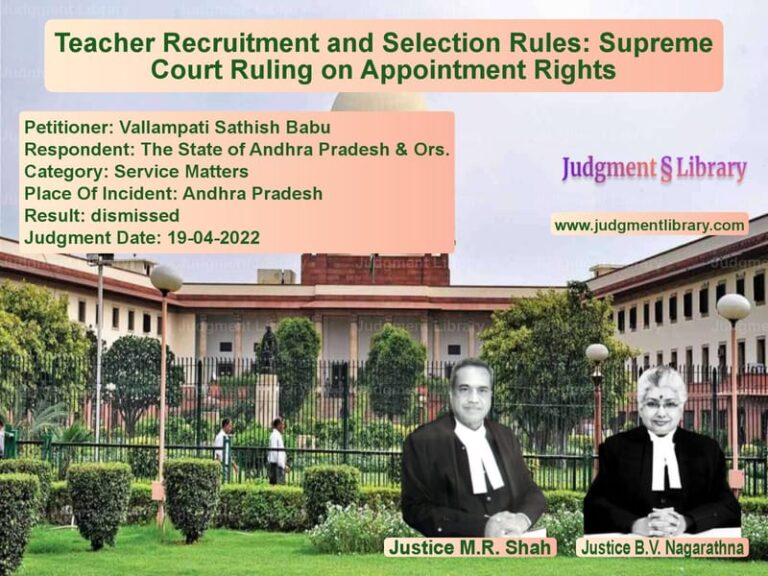Supreme Court Upholds Life Sentence in Father-Daughter Incest Case Under POCSO Act
In a powerful affirmation of child protection laws, the Supreme Court of India has dismissed a special leave petition filed by Bhanei Prasad @ Raju, who was convicted for repeatedly committing aggravated penetrative sexual assault on his own minor daughter. The judgment, delivered on August 4, 2025, by Justices Aravind Kumar and Sandeep Mehta, not only upheld the life imprisonment sentence but also awarded enhanced compensation of Rs. 10.5 lakh to the victim, emphasizing that justice must extend beyond punishment to include meaningful rehabilitation and restitution.
The case represents one of the most disturbing forms of sexual violence – incestuous abuse by a father against his own child. The victim was just around ten years old when the sustained assaults occurred within what should have been the safety of her home. The Court’s ruling sends a clear message that such betrayals of trust will be met with the severest judicial response, reflecting the evolving jurisprudence under the Protection of Children from Sexual Offences (POCSO) Act, 2012.
The Case Background
The facts of the case reveal a story of unspeakable betrayal of trust by none other than the father of the victim, who stands convicted for repeatedly committing aggravated penetrative sexual assault upon his own minor daughter, who was just around ten years old at the time of the incident. The acts were not isolated incidents but sustained, deliberate assaults within the safety of the home, a place where every child expects protection.
The Trial Court had conducted a meticulous evaluation of the evidence, including the oral testimony of the victim (PW3), corroborating evidence from her elder sister (PW2), and compelling forensic and medical records. Based on this evidence, the court returned a verdict of guilt. The High Court of Himachal Pradesh subsequently affirmed the conviction and imposed the sentence of life imprisonment in addition to fine through its judgment dated July 3, 2024, in Criminal Appeal No. 562 of 2019.
Legal Framework and Presumption of Guilt
The Supreme Court emphasized the special nature of POCSO cases, noting that the jurisprudence under the POCSO Act has evolved as a bulwark against predatory crimes targeting the innocence of childhood. The Court specifically highlighted Section 29 of the POCSO Act, which creates a statutory presumption of guilt once foundational facts are established.
The Court observed: “Section 29 of the POCSO Act creates a statutory presumption of guilt, once foundational facts are established. In the present case, this presumption stood unrebutted. The victim’s testimony was unwavering, medically corroborated, and free from embellishment. Her disclosure, though delayed, was truthful and borne out of perennial trauma and threats she has undergone.”
This legal presumption places a significant burden on the accused to rebut the allegations once the prosecution establishes the basic facts of the case, reflecting the legislature’s intent to provide enhanced protection to child victims.
Evaluation of Evidence and Testimony
The Supreme Court firmly rejected the petitioner’s argument that he was falsely implicated due to strained domestic relationships and disapproval of his daughters’ romantic alliances. The Court found this argument completely hollow, stating: “No daughter, however aggrieved, would fabricate charges of this magnitude against her own father merely to escape household discipline.”
The Court reinforced the established legal principle regarding child testimony in sexual offense cases: “It is now well settled that the testimony of a child victim, if found credible and trustworthy, requires no corroboration. The Courts below have not merely accepted the victim’s account, they have validated it through unimpeachable scientific evidence. The DNA report sealed the evidentiary chain and has dispelled all doubts in the prosecution case which is sought to be assailed by the petitioner.”
The Trauma of Sexual Abuse and Familial Betrayal
The judgment contains powerful observations about the lifelong impact of sexual abuse, particularly when the perpetrator is a family member. The Court stated: “This Court has repeatedly underscored that in offences involving sexual abuse, especially against children, the trauma suffered by the victim is lifelong. The scars are not merely physical but psychological, cutting across every fibre of trust, safety, and dignity. When the perpetrator is none other than the father, the natural guardian, the crime assumes a demonic character.”
The Court further elaborated on the unique nature of incestuous abuse: “When a father who is expected to be a shield, a guardian, a moral compass, becomes the source of the most severe violation of a child’s bodily integrity and dignity, the betrayal is not only personal but institutional. The law does not, and cannot, condone such acts under the guise of rehabilitation or reform. Incestuous sexual violence committed by a parent is a distinct category of offence that tears through the foundational fabric of familial trust and must invite the severest condemnation in both language and sentence.”
Constitutional Vision and Cultural Principles
The judgment beautifully integrates ancient wisdom with constitutional principles, quoting Sanskrit scriptures to emphasize the importance of honoring women. The Court noted: “As per ancient scriptures: ‘Yatra nāryastu pājyante ramante tatra devatāḥ, yatraitaastu na pājyante sarvāstatra aphalāḥ kriyāḥ.’ ‘Where women are honoured, divinity flourishes; and where they are dishonoured, all acts become fruitless.’ This verse reflects not merely a cultural principle but a constitutional vision. The dignity of women is non-negotiable, and our legal system must not permit repeated intrusion into that dignity under the guise of misplaced sympathy or alleged procedural fairness.”
Rejection of Bail and Special Leave Petition
The Court firmly rejected the prayer for interim bail, stating: “Our judicial conscience does not permit casual indulgence in a prayer for interim relief of bail where the conviction has been rendered after full-fledged trial, affirmed in appeal, and the testimony of the victim is clear, cogent, and duly corroborated. This Court has repeatedly held that in serious offences under the POCSO Act, particularly those involving familial betrayal of trust, relief cannot be granted as a matter of routine.”
The Court was unequivocal in its dismissal of the special leave petition: “Let it be stated unambiguously that entertaining of the present petition or remotely considering the grant of bail in a case of this nature, after the guilt has been proved and affirmed, would not merely undermine the majesty of the law, it would amount to a betrayal of the constitutional promise made to every child of this country. It would be, in the considered view of this Court, a judicial insult to the sanctity of womanhood and a blow to every mother who teaches her child to believe in justice.”
Enhanced Compensation and Rehabilitation
In a significant move toward comprehensive justice, the Supreme Court exercised its powers under Article 142 of the Constitution to award enhanced compensation to the victim. The Court directed: “Having regard to the age of the victim at the time of the offence, the sustained nature of the abuse, and the constitutional obligation to provide meaningful redress, we direct that a sum of Rs.10,50,000/- (Rupees Ten Lakhs and Fifty Thousand only) be paid to the victim as compensation as per the Scheme by the State of Himachal Pradesh in the peculiar facts of the case.”
The Court provided detailed directions for the disbursement: “We direct that a sum of Rs.7,00,000/- (Rupees Seven Lakhs Only) be kept in a fixed deposit in any nationalised bank for a period of 5 years in the name of the victim and she would be entitled to withdraw the quarterly interest. The balance, Rs.3,50,000/- (Rupees Three Lakhs and Fifty Thousand Only) shall be paid to her by transferring the said amount to her account.”
The Court emphasized that justice must extend beyond conviction: “This Court reiterates that justice must not be limited to conviction, it must, where the law so permits, include restitution. In awarding this compensation, we reaffirm the constitutional commitment to protect the rights and dignity of child survivors, and to ensure that the justice delivered is substantive, compassionate, and complete.”
Conclusion and Legal Significance
The Supreme Court’s judgment represents a watershed moment in the interpretation and application of the POCSO Act, particularly in cases involving familial sexual abuse. The Court’s firm stance against granting any leniency in such cases, coupled with its emphasis on comprehensive justice through enhanced compensation, sets an important precedent for future cases.
The ruling reinforces that the home, which should be a sanctuary, cannot be permitted to become a site of unspeakable trauma, and the courts must send a clear signal that such offences will be met with an equally unsparing judicial response. The judgment stands as a powerful reminder of the judiciary’s role in protecting the most vulnerable members of society and upholding the constitutional promise of dignity and justice for all children.
Petitioner Name: Bhanei Prasad @ Raju.Respondent Name: State of Himachal Pradesh.Judgment By: Justice Aravind Kumar, Justice Sandeep Mehta.Place Of Incident: Himachal Pradesh.Judgment Date: 04-08-2025.Result: dismissed.
Don’t miss out on the full details! Download the complete judgment in PDF format below and gain valuable insights instantly!
Download Judgment: bhanei-prasad-@-raju-vs-state-of-himachal-pr-supreme-court-of-india-judgment-dated-04-08-2025.pdf
Directly Download Judgment: Directly download this Judgment
See all petitions in Juvenile Justice
See all petitions in Bail and Anticipatory Bail
See all petitions in Custodial Deaths and Police Misconduct
See all petitions in Legal Malpractice
See all petitions in Judgment by Aravind Kumar
See all petitions in Judgment by Sandeep Mehta
See all petitions in dismissed
See all petitions in supreme court of India judgments August 2025
See all petitions in 2025 judgments
See all posts in Criminal Cases Category
See all allowed petitions in Criminal Cases Category
See all Dismissed petitions in Criminal Cases Category
See all partially allowed petitions in Criminal Cases Category







